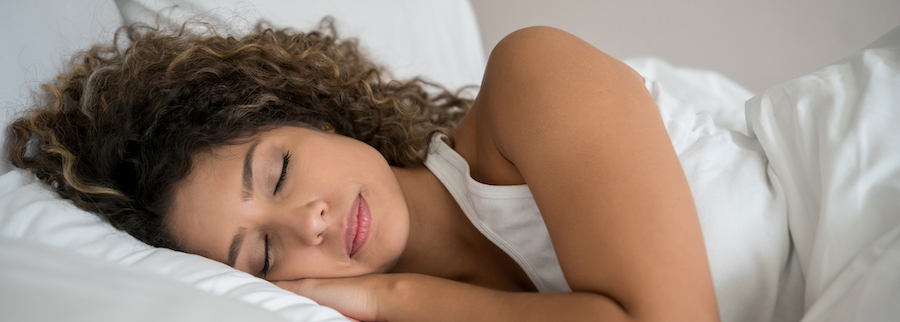Dreaming of Better Sleep?
According to the Centers for Disease Control and Prevention (CDC), a significant portion of adults in the United States experience issues with not getting enough sleep. Lack of sleep can harm your physical, mental and emotional health and put you at higher risk for chronic diseases.
 One in three adults in the U.S. has a sleep disorder
One in three adults in the U.S. has a sleep disorder
(Source: National Institutes of Health)
Treatment for Sleep Disorders
The Sleep Center team at Aiken Regional Medical Centers focus on diagnosing and treating sleep disorders, such as sleep apnea, insomnia, periodic limb movement disorder and other conditions. The Sleep Center offers comfortable, private bedrooms equipped with a sound machine and a large bed with hotel-grade linens.

Why Is Quality Sleep Important?
Getting a high-quality night's sleep is beneficial in many ways. It can help:
- Lower your risk for chronic disease
- Boost your immune system
- Improve your mood and energy level
- Improve your brain function
Poor quality of sleep can increase your risk of:
- Cardiovascular disease
- Cognitive decline and dementia
- Depression
- High blood pressure, blood sugar and cholesterol
- Obesity
How to improve the quality of your sleep
-
 Consistency is key. Go to bed and get up at the same time every day.
Consistency is key. Go to bed and get up at the same time every day. - Turn off all electronic devices 30 minutes before bed and place them outside your bedroom to charge.
- Keep your bedroom dark, quiet, relaxing and at a cool temperature at bedtime.
- Get regular exercise and eat a healthy diet.
- Avoid consuming caffeine in the afternoon and evening. Do not consume large meals and alcohol before bedtime.
Talk to your doctor if you are consistently having trouble sleeping, feel excessively tired or have trouble staying asleep.
Is Lack of Sleep Interfering With Your Daily Life?
Have you been experiencing any of the following symptoms for more than a few weeks?
- Tiredness during the daytime
- Snoring or stopping breathing in your sleep
- Waking up with a headache
- Having difficulty falling/staying asleep
- Snoring loudly
- Gasping or choking while sleeping
- Feeling tingling or restlessness in your legs when trying to sleep
If any of these symptoms sound familiar to you, it may be time to talk to your healthcare provider about a sleep study.
Sleep Studies
Sleep studies are noninvasive tests that involve attaching small monitoring devices to the head, arms, legs and torso to record and analyze your brain waves, breathing, heart rate, oxygen levels and muscle activity while you sleep. It can be the best way to diagnose sleep disorders, such as sleep apnea, restless leg syndrome, periodic limb movement disorder, narcolepsy, parasomnias and other sleep conditions.
Sleep study devices are painless. They are designed to allow patients to move around and to be as comfortable as possible.
It takes about two weeks for the board-certified sleep specialist to analyze the data from your completed sleep study. The sleep specialist then creates the treatment plan to be shared with your referring healthcare provider who will then explain the results and recommendations to you.
*A physician's referral is required. Prior authorization from your insurance may also be required.
After the sleep study
When will the results be ready?
It typically takes about one week for the results to be processed and a final sleep study report to be loaded into your chart. Each sleep study is scored by a technician and then reviewed by a sleep specialist.
Who receives the final sleep study report?
We will scan a copy of your completed report into your chart. You can access it through the patient portal or through the Release of Information (ROI) office on the first floor, or by calling 803-641-5066 to complete a request for it to be sent to your desired location.
What do I do next? Do I need another sleep study or Positive Airway Pressure (PAP) device?
Depending on the results of the sleep study, you and your doctor will decide what action to take next. It also depends on the type of sleep study that you had.
If you had a titration study or split night study and were successfully titrated, the report will probably recommend a pressure. Based on your insurance company’s authorization a Durable Medical Equipment (DME) provider can set you up with a new PAP device or change the setting on your current device (if you already have one). Your physician will need to send a prescription or request authorization for a PAP device to your DME provider.
You may need to come in for another sleep study if one of the following applies:
- You had ONLY a baseline study which reveals that you have a sleep disorder and may benefit from a titration study.
- You had a titration study or split night study but the titration was not completed. This could happen because there was not enough time for the titration, or the titration did not eliminate all events at the end of the study.
- Sometimes there are more complicated reasons for returning for another study. This will be detailed in your final sleep study report, and you should talk with your doctor if you have any questions.
Set up a Sleep Study
Whether you require an at-home study or a more in-depth, in-lab diagnostic test, our team is available to help you find a solution for your best sleep. For more information, call 803-641-8326.
